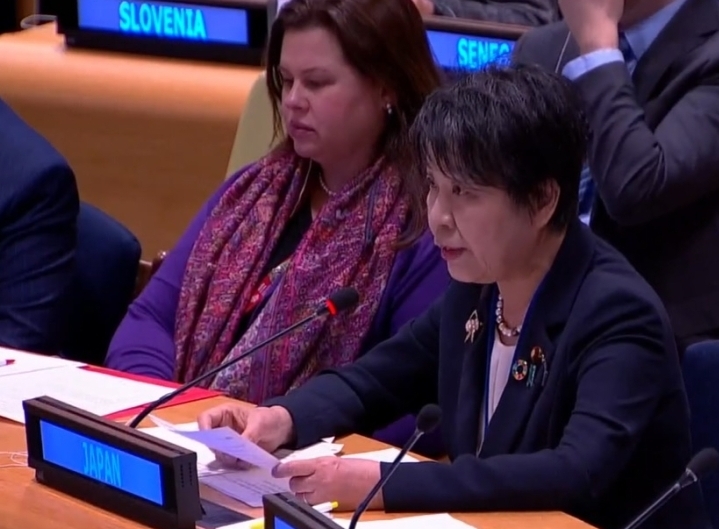Statement by H.E. Ms. KAMIKAWA Yoko, Special Envoy of Prime Minister of Japan, at the United Nations Security Council Arria Formula Meeting on Protection of Civilians
2023/3/22

(As delivered)
I thank Mozambique and Switzerland for convening this meeting on the important occasion of the World Water Day.
As we look for the comprehensive ways to achieve water-related goals at the UN Water Conference this week, it is also important to discuss the protection of water-related services and infrastructure under armed conflicts. We must not allow civilians who are already in vulnerable environments to fall into even more fragile situations.
Japan believes that international cooperation on water-related issues is critical, and I am chairing the interactive dialogue 3 of the UN Water Conference entitled “Water for Climate, Resilience and Environment” with H.E. Mr. Swelim, Minister of Water Resources and Irrigation of Egypt.
Safe access to water and sanitation services is one of the fundamental requirements for ensuring human security. With this in mind, Japan would like to stress the importance of protecting water and sanitation services in armed conflicts, and that strengthening such services, as well as supporting women and girls engaged, will lead to build peace.
First, water-related services and infrastructure, which are indispensable to the survival of civilians, shall be protected under international humanitarian law (IHL). Therefore, in general, attacking, destroying and militarily occupying such infrastructure is unacceptable. Japan urges all parties to the armed conflict to fully comply with their obligations under IHL and the Security Council Resolutions 2417 and 2573. Access to humanitarian assistance that provides water-related services should also never be impeded, and we must not forget that women and girls tend to fall into more vulnerable situations because of the lack of water services.
Because of Russia’s aggression against Ukraine, there are many people suffered from attacks to infrastructure and surviving the cold winter. Therefore, I launched an initiative to provide generators to people of Ukraine. Given that the electricity is required to water purification system too, I wish this initiative will contribute to their safe access to water.
Second, we should pay attention to how protecting and strengthening water and sanitation services will contribute to peacebuilding efforts. For many years, Japan has been supporting projects to improve the stability of conflict-affected areas and the well-being of its people by strengthening public services based on a Humanitarian-Development-Peace Nexus approach.
For example, JICA has been supporting such projects in Sudan and Côte d’Ivoire. In supporting these projects, women’s participation in the process is critical from the standpoint of the WPS agenda. In the case of Côte D’Ivoire, women were given opportunities to engage in leading the community, such as at the school management committee and the water management committee.
Today, water-related infrastructure and services are facing more challenges such as climate change. Japan reiterates that the international community must be united to tackle these greater challenges. To this end, we need to renew our commitment to protect and to strengthen water-related services and ensure human security for people affected by armed conflict.
Thank you very much.
As we look for the comprehensive ways to achieve water-related goals at the UN Water Conference this week, it is also important to discuss the protection of water-related services and infrastructure under armed conflicts. We must not allow civilians who are already in vulnerable environments to fall into even more fragile situations.
Japan believes that international cooperation on water-related issues is critical, and I am chairing the interactive dialogue 3 of the UN Water Conference entitled “Water for Climate, Resilience and Environment” with H.E. Mr. Swelim, Minister of Water Resources and Irrigation of Egypt.
Safe access to water and sanitation services is one of the fundamental requirements for ensuring human security. With this in mind, Japan would like to stress the importance of protecting water and sanitation services in armed conflicts, and that strengthening such services, as well as supporting women and girls engaged, will lead to build peace.
First, water-related services and infrastructure, which are indispensable to the survival of civilians, shall be protected under international humanitarian law (IHL). Therefore, in general, attacking, destroying and militarily occupying such infrastructure is unacceptable. Japan urges all parties to the armed conflict to fully comply with their obligations under IHL and the Security Council Resolutions 2417 and 2573. Access to humanitarian assistance that provides water-related services should also never be impeded, and we must not forget that women and girls tend to fall into more vulnerable situations because of the lack of water services.
Because of Russia’s aggression against Ukraine, there are many people suffered from attacks to infrastructure and surviving the cold winter. Therefore, I launched an initiative to provide generators to people of Ukraine. Given that the electricity is required to water purification system too, I wish this initiative will contribute to their safe access to water.
Second, we should pay attention to how protecting and strengthening water and sanitation services will contribute to peacebuilding efforts. For many years, Japan has been supporting projects to improve the stability of conflict-affected areas and the well-being of its people by strengthening public services based on a Humanitarian-Development-Peace Nexus approach.
For example, JICA has been supporting such projects in Sudan and Côte d’Ivoire. In supporting these projects, women’s participation in the process is critical from the standpoint of the WPS agenda. In the case of Côte D’Ivoire, women were given opportunities to engage in leading the community, such as at the school management committee and the water management committee.
Today, water-related infrastructure and services are facing more challenges such as climate change. Japan reiterates that the international community must be united to tackle these greater challenges. To this end, we need to renew our commitment to protect and to strengthen water-related services and ensure human security for people affected by armed conflict.
Thank you very much.
